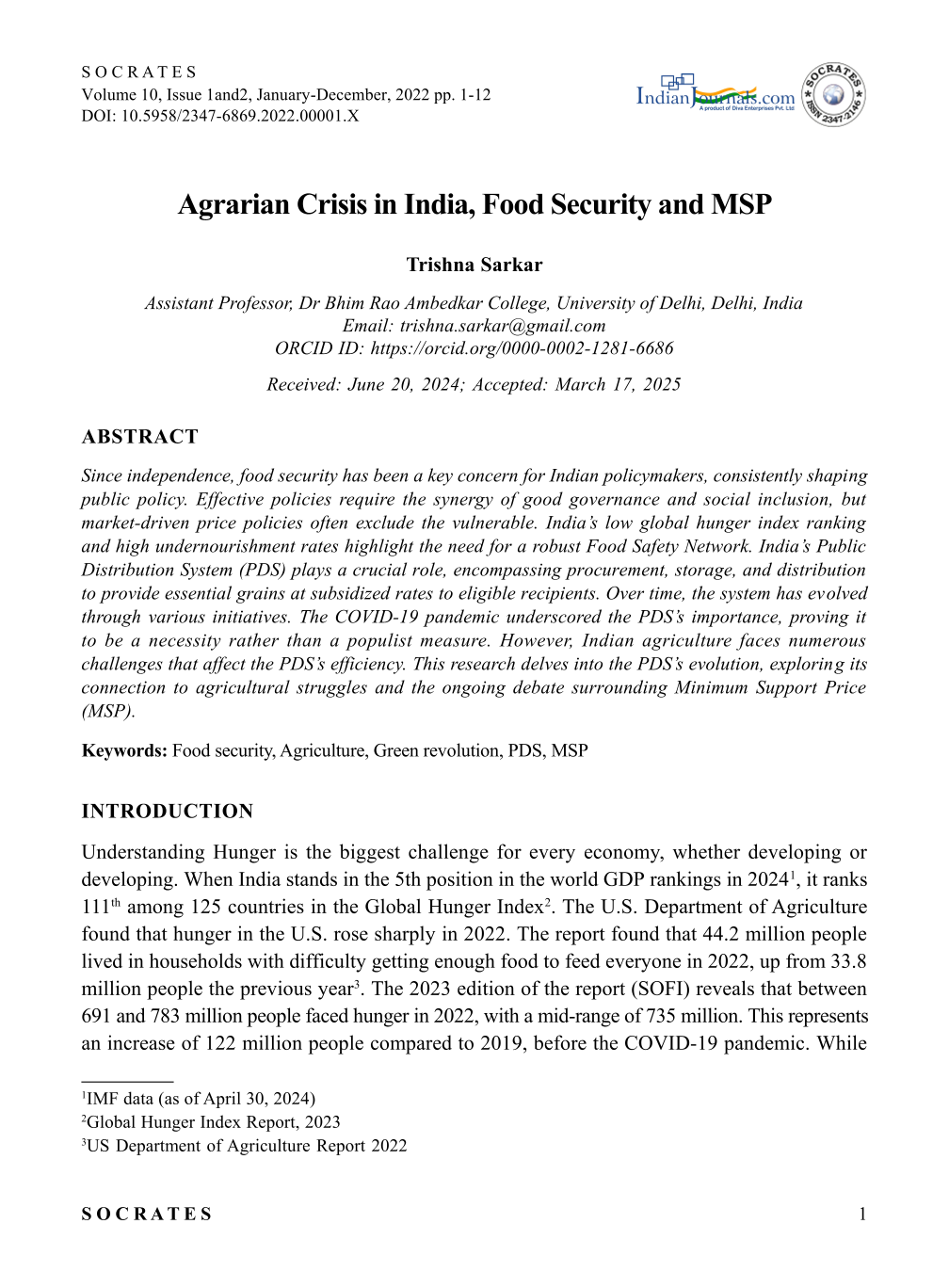Agrarian Crisis in India, Food Security and MSP
Main Article Content
Abstract
Since independence, food security has been a key concern for Indian policymakers, consistently shaping public policy. Effective policies require the synergy of good governance and social inclusion, but market-driven price policies often exclude the vulnerable. India’s low global hunger index ranking and high undernourishment rates highlight the need for a robust Food Safety Network. India’s Public Distribution System (PDS) plays a crucial role, encompassing procurement, storage, and distribution to provide essential grains at subsidized rates to eligible recipients. Over time, the system has evolved through various initiatives. The COVID-19 pandemic underscored the PDS’s importance, proving it to be a necessity rather than a populist measure. However, Indian agriculture faces numerous challenges that affect the PDS’s efficiency. This research delves into the PDS’s evolution, exploring its connection to agricultural struggles and the ongoing debate surrounding Minimum Support Price (MSP).
Downloads
Article Details
Section

This work is licensed under a Creative Commons Attribution-NonCommercial 4.0 International License.
Attribution-NonCommercial 4.0 International (CC BY-NC 4.0)

How to Cite
References
Bhalla G.S., Chadha G.K., Kashyap S.P. and Sharma R.K., Agricultural Growth and Structural Changes in the Punjab Economy: an Input-output Analysis, Research Report 82, International Food Policy Research Institute, Washington DC, 1990.
Chand, Ramesh, Understanding the Next Agricultural Transition in the Heartland of the Green Revolution and Food Security in India: A Review, In Thapa, Gopal, P.K. Viswanathan, Jayant K. Routray and Mokbul M. Ahmad (eds.), Agricultural Transition in Asia: Trajectories and Challenges, Asian Institute of Technology, Bangkok, Thailand, pp. 65-99, 2010.
Gaikwad PG, Green Revolution in India, Review of Socioeconomic and Political Consequences, Historicity Research Journal, Vol 9, Issue 9, May 2023.
Henry Knight, Food Administration in India, (Stanford: Stanford University Press, 1954), p. 189.
Kew, Mushtaq A., “Famines in Kashmir, 1586-1819: The policy of the Mughal and Afghan rulers,” The Indian and Social History Review, (1996): 63, accessed September 3, 2021, https://journals.sagepub.com/doi/abs/10.1177/001946469603300103?journalCode=iera.
L.N Rangarajan, The Arhashastra, Kautilya, Penguin Classics, 1987.
Ministry of Agriculture & Farmers Welfare, Procurement at MSP, PIB Delhi, 16 MAR 2021.
Pathak H, Mishra JP, Mohapatra T, Indian agriculture after Independence, Pg 426, ICAR, New Delhi, 2022.
Rashid, A., “Famine in the Turco-Afghan Period,” Proceedings of the Indian History Congress, Vol. 26, PART II (1964): 86, accessed September 1, 2021.
Sandhu, Jashandeep Singh (2014). "Green Revolution: A Case Study of Punjab". Proceedings of the Indian History Congress. 75: 1192–1199, 2014.
Shenoy, Bellikoth Raghunath, Indian Economic Policy. United States, Humanities Press, 1968.
Singh, Udaya Kumar, Public Distribution System. India, Mittal Publications, 1991.
Swaminathan, M. S. "From Green to Ever-Green Revolution". The Financial Express. Retrieved 16 April 2020 & Rajagopal, Gopi. "The Stories of Ehrlich, Borlaug and the Green Revolution". The Wire (India). Retrieved 16 April 2020.
Ziauddin Barani, Tareekh-e-Firuz Shahi, trans. Syed Moin ul Haq (Lahore: Urdu Science Board, 1969), 707.

